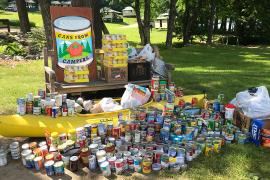In Beach Lake, Pennsylvania, at a large residential summer camp, over one hundred male counselors pack the air-conditioned canteen on July 1. It is late as the off-duty counselors watch the re-run of the United States vs. Belgium World Cup soccer game. Groups of enthusiastic soccer fans huddle close to the television as the game goes into extra time because of a tied score at the end of regulation play. Minutes later, an eruption of voices reverberated through the camp, waking up children in nearby bunks. What was the cause of such a boisterous cheer? A Belgian goal eliminating the United States? That can't be right. We're in America, so why were all the male counselors rooting against the home team?
For many years, residential summer camps have employed American and international staff as counselors, support staff, and in leadership positions. The number of international staff members working as counselors has risen sharply over the past decade.
According to Marc Honigfeld, co-owner and director of Trail's End Camp in Beach Lake, Pennsylvania, while the number of international counselors has grown, there has been a dramatic drop-off in the total amount of American male counselors currently employed by camps across the United States (2015). Not only is the lack of retention of these male counselors troublesome, but also one of the top staff recruiting issues among camps over the past several summers has been recruiting male applicants (ACA, 2014).
Recruiting Realities
There has been a continuing initiative to correct this problem by using two main recruiting methods. Usually, directors rely on word of mouth from current or former employees and college fairs to recruit and hire prospective male counselors. Year-round staff members commonly take a "college tour" trip for recruiting purposes, sometimes visiting up to ten universities during a given off season. These tours increase the awareness of summer camps on college campuses but can be met with mixed results when it comes to securing commitments from future prospective staff. These approaches, while helpful, have not led to an overflow of interested, competent male staff. While recruiting at the university level is ideal, a more centralized focus on colleges' education department is critical.
I suggest that camp directors focus more of their off-season recruiting attention on future teachers for two primary reasons: In my opinion, the characteristics that make a successful teacher correlate strongly to success as a camp counselor, and there is possibly a higher probability of retention, as future teachers are more likely to return and continue working at camp after college graduation.
To be successful in camp, counselors need to be able to:
- Communicate effectively with their fellow staff as well as campers
- Maintain a high level of energy throughout the summer
- Build positive relationships with children
- Serve as a positive role model
- Sustain consistent routines
These characteristics are similar to those instilled in future teachers on a daily basis by their professors during their coursework throughout college.
Tapping into the Future Teacher Pool
In academia, college students who are in the process of learning to become future educators are called pre-service teachers (PTs). This process typically lasts between two and three years, and includes coursework covering behavior management, effective communication, evaluation techniques, specific pedagogical content knowledge, and countless hours of early field experience working with a specific age group. At this stage in their education, PTs can benefit from gaining teaching experience regardless of the subject matter, age, or location.
Because of their newness, professors recommend that PTs take as many opportunities as possible to hone their craft (Santagata, Zannoni, & Stigler, 2007). Working in a summer camp is the perfect prescription for two main reasons: (a) In no other situation will PTs have the opportunity to engage with children for 24 hours a day over an extended period of time, and (b) a summer camp's relaxed environment provides the perfect setting to experiment with behavior and management strategies, both of which are essential to effective teaching. Working in this setting is the ideal scenario for any future educator looking to gain both experience and competence.
Within the college of education at most universities, students negotiate their experiences in large cohorts. All PTs take similar classes while participating in comparable teaching experiences, which can lead to a lack of diversity among job applicants. Going above and beyond required coursework can set students apart and assist them in securing a teaching job after graduation. Working as a counselor over the summer can offer PTs a substantial distinction over other prospective teachers, improving the likelihood of obtaining a teaching position.
Mutual Benefits
This partnership between PTs and summer camps is appealing to universities from coast to coast. As a result of the additional teaching experience that camps provide, PTs will likely improve their teaching abilities over the summer returning to campus as an improved educator. This added experience can only enhance the PTs' education and supplement their coursework and teaching opportunities provided by the university, better preparing them for higher-level teaching upon graduation. In addition, universities can also benefit from these partnerships with specific camps, which provide consistent summer job opportunities for their students.
The ultimate goal of such a partnership is to allow for a constant flow of PTs from a university willing and able to work at a specific camp. To ensure initial success, find a couple of exceptional students who are enthusiastic and passionate about the opportunity to work as counselors. Doing so offers two specific benefits: These PTs will recommend others in the program to follow suit, and should return to their university as more effective teachers, with improved pedagogical practices providing tangible evidence of success. Not only will those PTs who worked the previous summer enthusiastically tout the value of working as a camp counselor, but professors will vehemently encourage other students to take advantage of the camp learning environment. This cycle can continue, leading to a large number of future educators from one university.
Creating a mutually beneficial partnership is paramount for the long-term success of this recruiting avenue and can be accomplished in a few simple steps. First, it is imperative that directors assess their camps' specific needs to figure out where best to look for job candidates who can fill those needs. For example, a camp with a performing arts emphasis should locate universities with drama and theater education programs, whereas sport camps should focus their attention on colleges with a strong emphasis on physical education.
Once a camp has established its specific staffing needs, another crucial aspect of creating a successful camp-university partnership is finding a professor within a relevant field. Camp directors are encouraged to attend state, regional, and national conferences that focus on their area of need to meet university faculty members who might fit the bill. Professors often attend a variety of conferences throughout the year, so a camp director's presence can provide an opportunity to quickly make connections with faculty.
When searching for professors who can be strong liaisons between camp and prospective camp counselors, keep in mind that it isn't necessary for the professors to have prior knowledge of summer programs. Many professors will be unaware of the possibilities and advantages of setting up a pipeline of PTs to a specific camp. It is the camp director's job to educate the faculty about his or her camp's philosophy, facilities, camper background, and a typical day schedule.
Finally, it is imperative to clearly explain the benefits of creating this partnership for the university, the PTs, as well as for the camp itself. Ensuring the professors understand these benefits will increase the likelihood of them becoming enthusiastic recruiters of up-and-coming educational talent for your summer camp programs.
While the steady influx of international staff to American summer camps continues to have positive influences on our campers, the steady decline of homegrown male camp counselors is alarming. I believe we can address this issue, and perhaps reverse the trend, by targeting PTs enrolled in relevant education programs across the country — particularly PTs studying physical education. This often male-dominated field is ripe with prospective male counselors who can positively impact camps in countless ways. Reaching out to professors within this field nationwide to create these partnerships can help solve this epidemic.
The ability to recruit a balance of solid counselors from within and outside U.S. borders will ensure a well-rounded, positive experience for campers — and enough diversity to cheer on any team in the World Cup.
National Education Conferences for Consideration
Physical education:
• SHAPE America National Convention and Expo —www.shapeamerica.org/events/convention2016
• PETE Physical Education Teacher Education — www.shapeamerica.org/events/pete
• National PE Institute — http://nationalpe.com
Adventure education:
• Association for Outdoor Recreation and Education — www.aore.org
Art education:
• National Art Education Association — www.arteducators.org/news/national-convention/national-convention
• Conference for Community Arts Education —http://communityartsed.nationalguild.org/Home.aspx
Photos courtesy of Monarch Camps, Los Angeles Valley College, Valley Glen, California; Whippoorwill Farm Day Camp, Fairview, Tennessee; Camp Sizanani / Global Camps Africa, Reston, Virginia; Lakeview Day Camp, East Brunswick, New Jersey; and Summer at Park, Brookline, Massachusetts.
References
American Camp Association (2015). Fall 2014 camp enrollment and staff recruitment survey. Retrieved from www.ACAcamps.org/sites/default/files/resource_library/2014-Fall-Enrollm…
Marc Honigfeld, M. (2015, June 28). Personal communication. Santagata, R., Zannoni, C., & Stigler, J.W. (2007). The role of lesson analysis in pre-service teacher education: an empirical investigation of teacher learning from a virtual video-based field experience.
Journal of Math Teacher Education, 10, 123-140.


